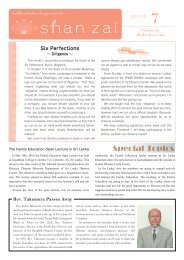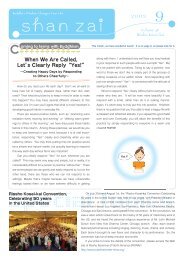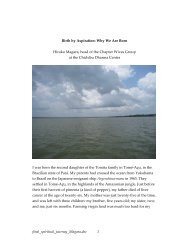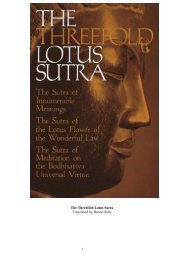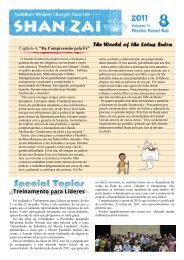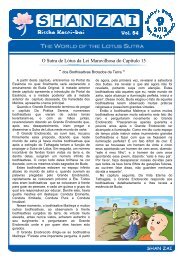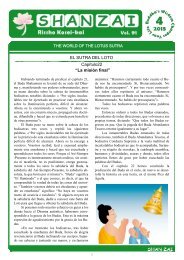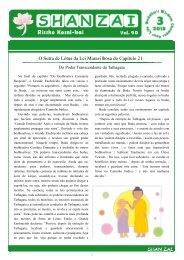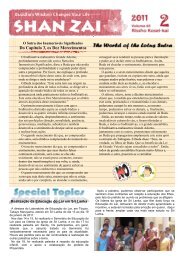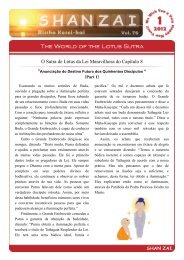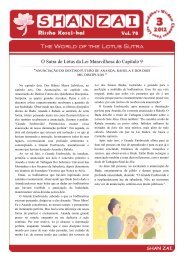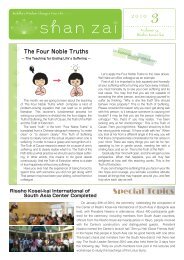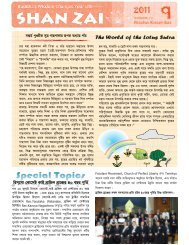Create successful ePaper yourself
Turn your PDF publications into a flip-book with our unique Google optimized e-Paper software.
Cold Birds and Barrels of OilEffort and assiduity are <strong>the</strong> most fundamental ways <strong>to</strong> improve ourselves. The significance of<strong>the</strong>se basic virtues is <strong>the</strong> same in study, work, management, and life in general, but because<strong>the</strong>y are so basic, we on occasion neglect <strong>the</strong>m. In <strong>the</strong> same way, despite <strong>the</strong> fact that air andwater are absolutely vital for our existence, people do not seem <strong>to</strong> notice <strong>the</strong>m.Although we realize that we cannot accomplish anything by working halfheartedly, we oftentake <strong>the</strong> easy way out, thinking that it does not matter whe<strong>the</strong>r we apply ourselves <strong>to</strong>day or<strong>to</strong>morrow or neglect our work. The Buddha admonishes us <strong>to</strong> shun this attitude by way of <strong>the</strong>parable of a mythical bird in <strong>the</strong> Himalayas. The Himalayan nights are extremely cold, and <strong>the</strong>female of <strong>the</strong> species seems <strong>to</strong> cry all night long, "I'm dying of cold. I'm dying of cold." The maleseems <strong>to</strong> cry through <strong>the</strong> night, "Build a nest at dawn. Build a nest at dawn." With no nest <strong>to</strong>keep <strong>the</strong>m warm, <strong>the</strong> night is unbearably cold, and <strong>the</strong>y wait for dawn <strong>to</strong> build a nest forshelter. However, when morning comes and <strong>the</strong> sun shines, <strong>the</strong>y are carefree in <strong>the</strong> warmth ofits rays. They forget about building a nest and pass <strong>the</strong> day leisurely. Predictably, when nightfalls, <strong>the</strong>y suffer from <strong>the</strong> extreme cold and take up <strong>the</strong>ir cries again. They continue this until<strong>the</strong> end of <strong>the</strong>ir lives.We should not laugh at <strong>the</strong>ir folly. There are many people who neglect <strong>to</strong> build "a nest for <strong>the</strong>spirit" in which <strong>the</strong>y can always be at ease, no matter how <strong>the</strong> world around <strong>the</strong>m changes.Engrossed in what is right in front of <strong>the</strong>m, <strong>the</strong>y tell <strong>the</strong>mselves, "I'll get around <strong>to</strong> it sometimesoon, sometime before long." They completely neglect <strong>to</strong> make consistent efforts <strong>to</strong>ward thatend. When things get <strong>to</strong>ugh, <strong>the</strong>y become a bit more serious, but when things lighten up, <strong>the</strong>ybecome neglectful again. They never build a nest that would give <strong>the</strong>m peace of mind. Any nest<strong>the</strong>y do manage <strong>to</strong> build is <strong>the</strong> kind that is blown away in <strong>the</strong> first strong wind or leaves <strong>the</strong>msoaked in <strong>the</strong> first rain. This is <strong>the</strong> weakness of not being consistent. If only <strong>the</strong>y were thorough,that nest would be a secure fortress lasting <strong>the</strong>ir whole lives. But <strong>the</strong>y are unable <strong>to</strong> take tha<strong>to</strong>ne step forward.There was once a Standard Oil Company employee named John D. Archbold (1848‐‐1916),whose colleagues never called him by his real name. Instead <strong>the</strong>y always called him "Fourdollars a barrel." The reason was that when he traveled and registered at a hotel, he wouldalways write under his name "Four dollars a barrel, Standard Oil." He did <strong>the</strong> same when signingletters and receipts. When John D. Rockefeller, <strong>the</strong> president of Standard Oil, heard about thisunusual employee, he was so impressed that he invited him <strong>to</strong> dinner. Archbold came <strong>to</strong> enjoyRockefeller's confidence, and many years later he became <strong>the</strong> company's second president.That he came <strong>to</strong> be recognized and relied on by Rockefeller was nei<strong>the</strong>r chance nor mere goodfortune. It resulted, ra<strong>the</strong>r, from his being so thorough in his daily efforts that he earned anickname for it. There are many such success s<strong>to</strong>ries in America, but this one has a particularlyvaluable moral, that thoroughness creates <strong>the</strong> real thing.Tettei, <strong>the</strong> Japanese word for thoroughness, originally was a Buddhist term. The BodhisattvaUniversal Virtue appears in <strong>the</strong> Lotus Sutra as a symbol of <strong>the</strong> preeminence of thoroughgoingpractice. He is always mounted on a white elephant, because an elephant crossing a riveralways steps firmly. Universal Virtue would have us understand that this kind of steadiness isimportant in carrying out any action.During <strong>the</strong> early eighteenth century in Japan, <strong>the</strong>re was an eminent ma<strong>the</strong>matician namedNoda Bunzo. Hearing of his abilities, Yoshimune, <strong>the</strong> eighth Tokugawa shogun, consulted OokaTadasuke, <strong>the</strong> commissioner of Edo, about giving Noda some appointment. Ooka summonedNoda and asked him, "I hear that you are quite learned in calculations, so tell me, what is onehundred divided by two?" From his bosom Noda <strong>to</strong>ok out his abacus, did <strong>the</strong> calculation, and41



